


















Prosper Isichei addresses key issues facing young people with a heart for mission: local church support, serving as a single person, women in mission, generational differences and more.
IFES workers at a Zambian university describe the opportunities and challenges.


Timothy Olonade believes in mentoring the younger generation in God’s word. As a result, he has seen youth leading underground fellowships in China and reaching young people in war-torn South Sudan!
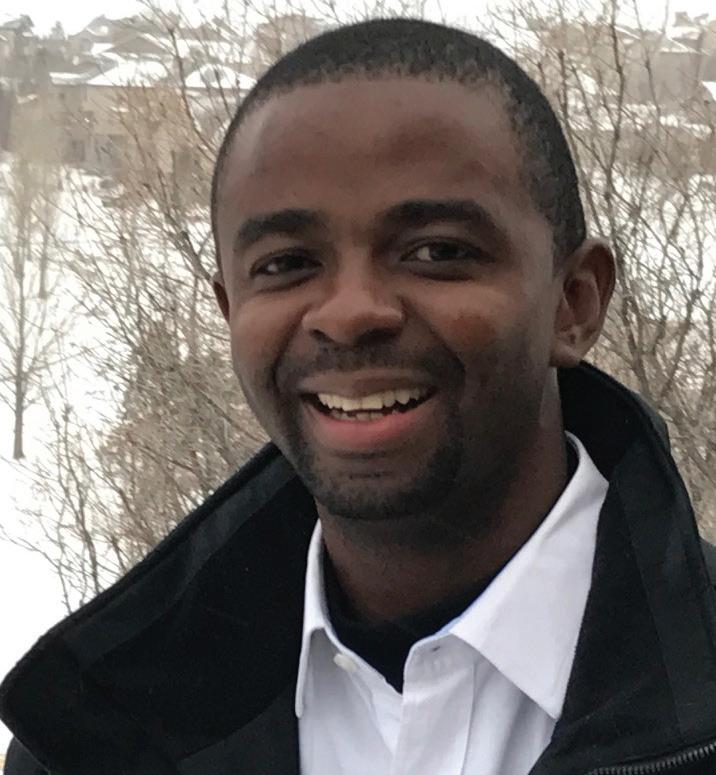


Thaddeus and Lucy Gichana are committed to youth work in Kenya.
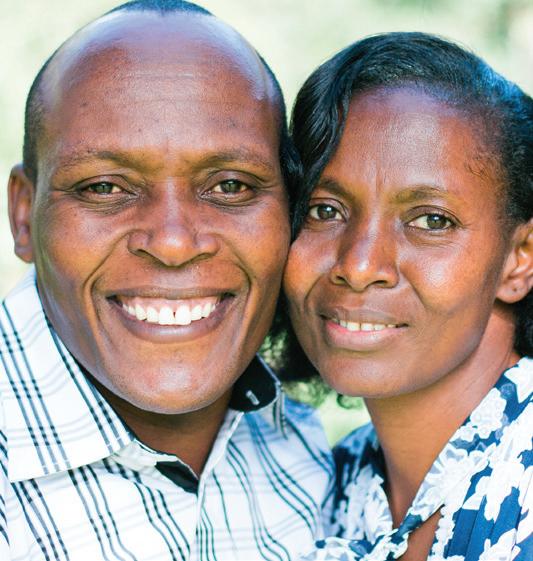

© 2017 AFRIGO
AFRIGO is a publication aimed at raising awareness, mobilising, training and inspiring churches and individuals in Africa towards global mission.
Editor: Suzanne Green Design: Pilgrim Communications
Cover: Students in Uganda, by Gideon Para-Mallam
The views expressed in the various features in this magazine are not necessarily those of the publisher. Stock photos are occasionally used. Pseudonyms are used when there are security concerns.
Don’t let anyone look down on you because you are young, but set an example for the believers in speech, in conduct, in love, in faith and in purity. (1Timothy 4:12)
When we talk about mission, it’s important that we acknowledge the part young people play in fulfilling the Great Commission. Though they may not have gained much life experience yet, they have energy, enthusiasm, flexibility and a heart that longs to see others saved. They are innovative and they take risks. They don’t give up due to discouragement. They simply find another way to achieve their goal.
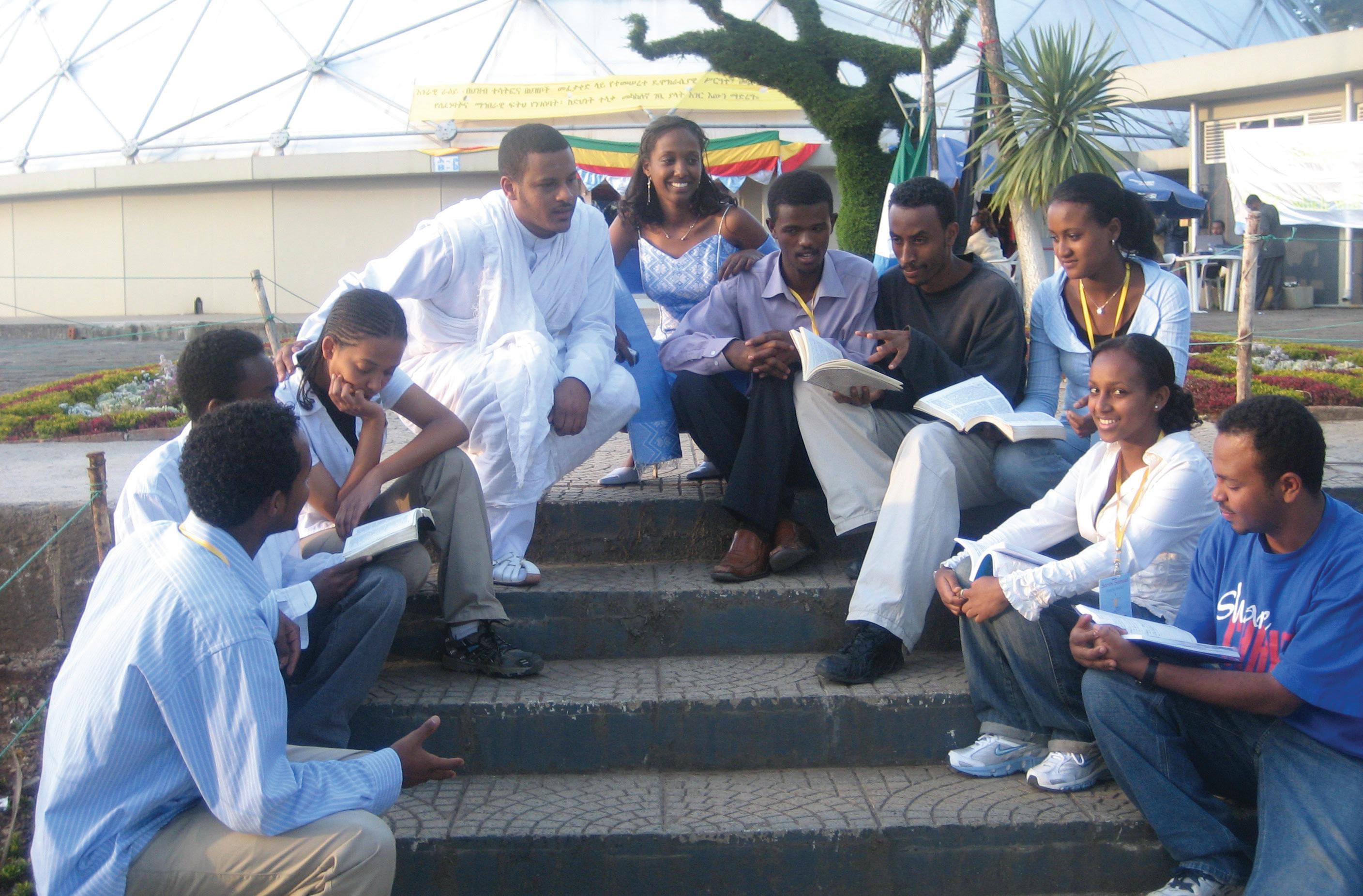
Naomi Mbewe, General Secretary for ZAFES (IFES work in Zambia) considers it a privilege to lead young teams involved in student ministry. “It’s a joy,” she says. “As challenging as it is, being able to deal with a youthful mind , which is seemingly at its peak in terms of discovery about what life can offer, free from parental guidance,
and enjoying the freedoms that come with campus life, is very fulfilling. Students can think and do so many things that we can’t even imagine. So, before we lose this youthful mind, it has to be shaped and transformed into something positive and useful, to the glory of God. I am glad I can be one of those helping with that process here in Zambia.”
The ZAFES vision is “to challenge students with the opportunity to know Christ and be nurtured to impact society for a lifetime”. Naomi explains that this happens through evangelism, Bible study, discipleship and training. “We want to see a mature breed of graduates,” she says, “balanced biblical Christians who will make a difference in the Church and in society.”
In this issue of AfriGO we feature training from Prosper Isichei for young people who are not content to sit back and wait when it comes to mission. In Perspective Timothy Olonade details a training and mentoring programme that is producing youth who “rise above the entitlement syndrome” so that they can reach out to the lost in South Sudan, China, Vietnam and other countries. “Such is the power of and love for God’s word in the lives of these young ones,” says Timothy, “that personal decision to honour God has become a singsong for them.”
Let’s not underestimate young people with a passion to take the gospel to the ends of the earth!
…being able to deal with a youthful mind, which is seemingly at its peak in terms of discovery about what life can offer … is very fulfilling.Photo: IFES
Prosper Isichei addresses key issues facing young people with a heart for mission.
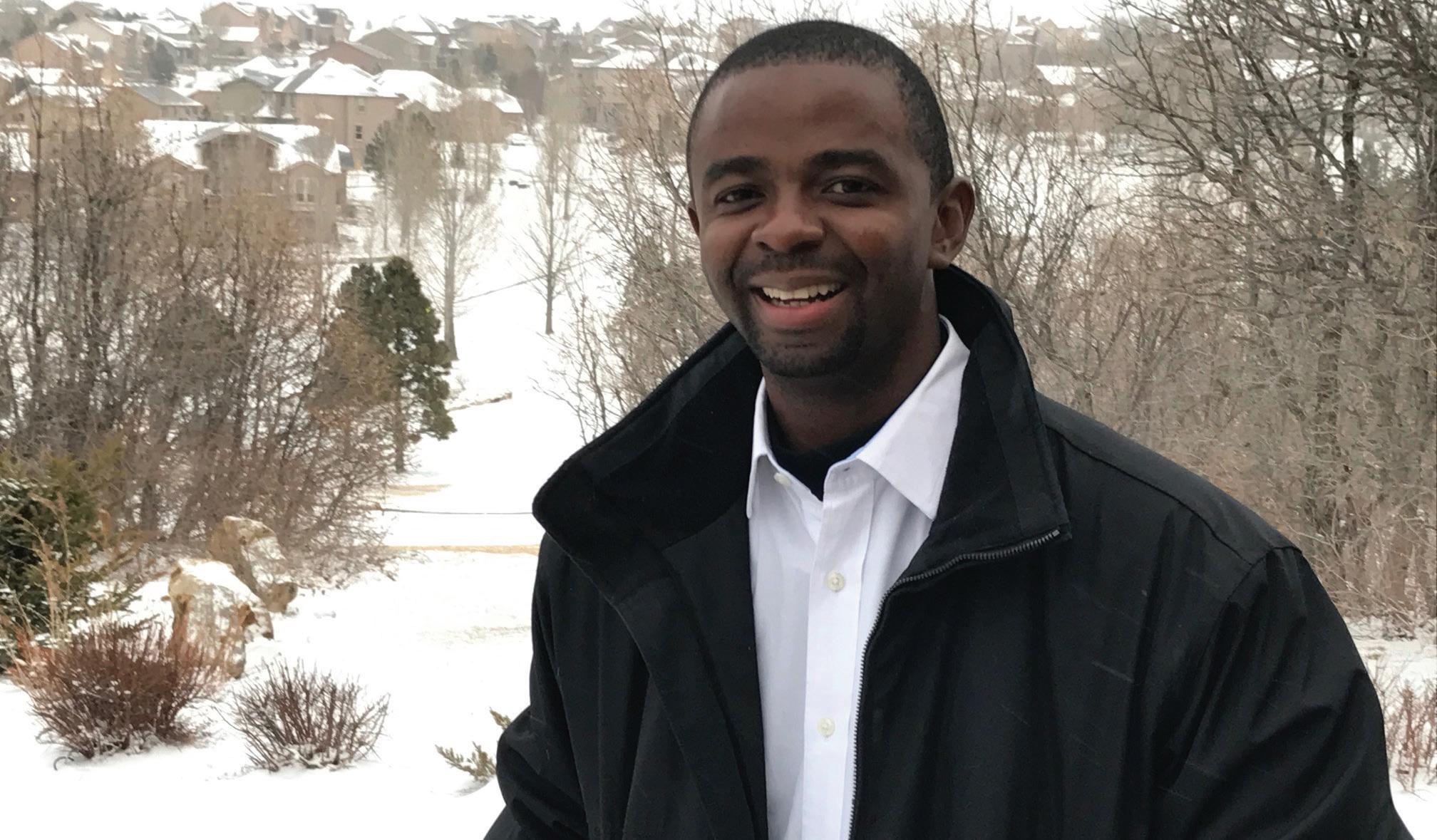
f a young person feels called to mission, what can help confirm that call?
As well as prayer and preparation, godly counsel is very important. God has placed people over you: parents, pastors, leaders, mentors and others. When the perceived call has turned into a conviction, it’s a good idea to share your experiences with any of these. They will give more insight and counsel that will further deepen your conviction.
Why is it important to have the support of a local church?
As you engage in the missions enterprise, never be deluded about being an active part of the local church. In one of our missions mobilisation projects, a young leader made a decision to pursue his call. We affirmed his resolution, having spent time listening to him and the Lord, but we asked him to return to his church and share with the leadership.
God granted him favour, and he was not only affirmed, but was given a scholarship for theological training. The
church also helped him begin a work among a least reached community, which is progressing fruitfully today.
Your church may not be missionsoriented, or they may have a rigid way of engaging in missions that may not accommodate your calling. But the church and your family (if they are Christians) are your strongest support base for your missions engagement.
What are the biggest challenges to youth getting involved in mission? How can these be overcome?
Some of the many challenges include:
Self - Personal ambition, interests and pursuits.
Pressure - From family and society to pursue a better life.
Satan - The devil will not give up on young people because he knows their potential.
Fears - The fear of failure, mediocrity, and uncertainty about the future.
Guilt/past - Until we reconcile with our past and embrace our identity in Christ, the torment of guilt will drive us away from following God in his mission.
Bad models and counsel – We can be discouraged when we hear stories of missionaries who have laboured for years with, seemingly, no fruit. We can also be damaged by poisonous counsel from hurting older practitioners.
To overcome these, die daily at the cross. Lay all your fears, cares, burdens, past, guilt, counsel and failures at his feet every day. Keep company with those who inspire and encourage you in mission. Maintain a radical commitment to following Christ, whatever the cost, even if it means death.
How can young women take their places in ministry when so much of the work is male-led?
What unique challenges do they face in responding to the Great Commission?
Scripture upholds the place of women in missions. In fact, a woman was the first proclaimer of the resurrection of Christ. William Booth, the Moravian missionaries, D.L. Moody, David Yonggi Cho and others have affirmed their priceless role, place and power in missions. And history records the sto-
ries of many women who have made a tremendous impact on global missions: Mother Teresa, Mary Slessor, Lottie Moon and Amy Carmichael, among others.
Africa is still a masculine society and the Church is still waking up to releasing the power of women. A young woman called to missions may face rejection, legislations against women in gospel proclamation, family resistance, cultural limitations and other challenges.
I encourage every young woman called to missions to discover her place in Christ through the Scriptures. Find a group of secure and confident women who share in the missions/ministry call and draw strength from their support. African Women in Missions (AWIM) is a great initiative/network empowering, mobilising and serving women in mission. (www.maniafrica.org)
Is it important to find your life partner and marry before serving in mission? Will a young single missionary be taken seriously? Marriage can be a blessing and benefit to those involved in ministry. And yet every missionary is complete, whether or not he or she is married. Stepping into your call should not be dependent on marriage. Marriage is rather dependent on certain variables: maturity (emotional and spiritual) of both parties; financial independence; clarity of purpose; need and not want for a partner; permission and consent.
Although a typical African community will accept the ministry of a young pastor or missionary, single people can face opposition. On more than one occasion I was refused a ministry opportunity because I wasn’t married at the time. Marriage attracts dignity, responsibility, acceptance, freedom to reach homes and much more.
Single people should not be excluded from playing their role in fulfilling the Great Commission. Although you may face pressure to marry, such challenges are not insurmountable.
Is it true that older Christian leaders may see the younger generations as a threat? How can young leaders effectively bring about necessary change with grace and wisdom?
Insecure older leaders perceive and relate to gifted young leaders as a threat. But a tactless, disrespectful, zealous, ambitious, and proud young leader makes him/herself a threat to older leaders. The wisdom, resources, affirmation, relationships and graces of older leaders go a long way in helping young leaders fulfil their calling. Therefore, grace for intentional healthy relationships with older leaders is critical.
Older leaders may be accustomed to hierarchical leadership, while the younger generation craves inclusive leadership. Older leaders may be inclined to maintain traditions; younger leaders challenge the status quo and possess the flexibility that drives innovation. These realities present young leaders with tough choices, barriers and ethical dilemmas in bringing about change in the mission enterprise.
I would encourage anyone willing to have healthy relationships with older leaders – and to maximise the priceless blessings that brings – to learn to: Trust older leaders. Don’t wait for it to be earned. Trust and trust until proven wrong. If you don’t trust them, they won’t trust you. Without trust there will be no meaningful relationship.
Respect them. Respect the older leaders in your life. Intentionally honour them. Respect the institution that unites you, and respect yourself. Respect builds the bridge across the generational gap.
Take the posture of a learner We are flooded daily with information, and knowledge accumulates at a fast pace! This can fuel the illusion of being superior to those whose knowledge and way of doing things seem archaic. Remember that you have much to learn from the invaluable experience of older leaders.
What helpful or wise advice about ministry have you received from an older Christian?
“The being precedes the doing.” I have heard this in different forms over and over from a few older leaders God brought into my life. This has greatly shaped my life and ministry.
Prosper Nkechukwuaga Isichei is founder of Threshold Christian Network International (www.tcninternational. org), a ministry focused on equipping and mobilising young people for the Great Commission.
He has been involved in youth ministry and missions mobilisation for the past 15 years. At age 16 he had the opportunity to lead a teenage ministry/movement with more than 300 members. As an undergraduate, he was deeply involved in student ministry with NIFES, an IFES affiliate (then the largest student fellowship). He served at all levels, eventually becoming Student National Vice President. He was then a volunteer staff member for two years.
• The Challenge of Missions (Oswald Sanders)
• God’s Women Then and Now (Deborah M. Gill & Barbara Cavaness)
• Out of the Comfort Zone (George Verwer)
• Missions and You (Reuben Ezemadu)
• Youth and Missions (Paul Borthwick)
• The Distant Boat (DVD)
• Missions conferences and consultations (all levels)
An ordained minister, Prosper served as a youth pastor 2009-2014. In 2012 he was appointed Pioneer Continental Coordinator for Emerging Leaders Network (ELN) under Movement for Africa National Initiatives (MANI). The primary aim of the ELN network is to mobilise African young leaders for mission on the continent.
(maniafrica.com/network-facilitators/ emerging-leaders)
Prosper is married to Blessing Onyinyechi, and they have a son, Nathan Nissi.
Kalidas Bwalya says, “I got saved in my teens, so I feel passionate about young people. I believe it’s the time that they either lose or find their way. Being in a position where I can share Christ with them is something I count as privilege.”
Kalidas, a student at Copperbelt University in Kitwe, Zambia, works with ZAFES, the student ministry of IFES in Zambia. The International Fellowship of Evangelical Students (IFES) has a vision to see students built into communities of disciples, transformed by the gospel and impacting the university, the church and society for the glory of Christ.

“My life as an on-campus evangelist is one that I really enjoy,” she says. “Apart from being a student
in the School of Business, studying economics, my other important reason for being here is to win souls for Christ.
“You can only give out what you have. I have Christ in me. He saved me and, therefore, I have to let someone else know Christ as well. And students are the best people to evangelise the student world because we know and understand our own context.”
The beginning of a new academic year is filled with many uncertainties, especially for those who barely know their way around campus – the first years. For this reason, and in response
Students are the best people to evangelise the student world because we know and understand our own context.Kalidas (far right) and the ZAFES team
A student at Apex Medical University describes how she came to faith during her first year:

One day, as I was about to go out for a drink with a couple of friends, I heard a knock on my door. It was two ZAFES members going round our boarding houses doing evangelism. I hesitated about letting them sit down because I knew my friends would be at my door step soon. But they insisted that they needed to pray with me before I could go out.
Reluctantly I gave them a few minutes. They started praying with me, and asked God to help me realise how important it is to put Him first and to receive the Lord Jesus as my Lord and Saviour. Somehow I felt conviction and when my friends came to pick me up, I told them that I would find them. But I never followed my friends.
That evening I didn’t understand much about how I should live as a Christian. But one thing I was sure about was that I had received the Lord Jesus as my Lord and Saviour. I was a changed person. The Lord started working on me, and the desire to do the things I used to do was no longer there.
The ZAFES people continued to visit me, and eventually invited me to their weekly fellowship meetings. Reluctantly, I went along, and found a number of students who seemed to be enjoying themselves in the presence of God. That evening I found myself singing and dancing to songs that made a lot of sense and had meaning for the first time. Since then, I have been a committed member of ZAFES and, by God’s grace, I keep learning on a daily basis.
to the Great Commission, every year ZAFES Copperbelt University Fellowship (CBU) does evangelistic outreach during first years’ registration.
This year was no exception. From 14 to 18 August, 16 CBU missionaries, as well as members from 19 other campus fellowships, turned up for this glorious mandate. Kalidas and others shared the gospel of Christ with 208 first-year students. Many of them said they were already Christians, and pledged to be part of the fellowship.
Registration can be nerve-wracking, and first years are faced with numerous challenges. These include accommodation, food, stationery costs and directions to major offices around campus. The presence of ZAFES eases some of these burdens by providing shelter, food and any other needs that can be met.
First-year students who have not found permanent accommodation by the end of the day are taken in by the missionaries. Many are overwhelmed by the services rendered and the love they see in action.
Along with the opportunities and joys of student ministry in Zambia come the challenges. Those that particularly hinder ZAFES work include a lack of both human and financial resources. Currently there are five full-time staff workers for 75 Christian Fellowships throughout the country. The ratio is 1:15, which makes it very difficult to be effective. Please join us in praying for mature and committed staff, funds for staff salaries and literature production, and committed student leaders.
Despite the challenges, there is total joy in serving God through student ministry. Not everyone wants to do it –it has to be a calling from God.
Because the government has declared Zambia a Christian nation, we have an open door to freely share the gospel. We have partnerships with like-minded institutions and churches, and we enjoy the good will of associates all over the nation. Today there are many students who are ripe for the word of God!
Naomi Mbewe is General Secretary for ZAFES, the IFES ministry in Zambia. In this role she oversees the work of the movement at a national level, and is in charge of the ZAFES management team. “Our call is to the students,” she says, “so my overall job is to make sure that our staff, associates and volunteers are on campus to nurture the believing student so that they can share Christ with the non-believing student.”
She grew up in a Christian home, and committed her life to Jesus in 1990. Five years later she left for college to study mechanical engineering, and right away joined the vibrant ZAFES group. “I learned that the zeal I had for prayer was to be coupled by the Word of God if I was to be effective,” she says. “I also learned how to do personal devotions, and search the Scriptures, and at the end of my first year, I was given a leadership position that continued until the end of the threeyear programme. After that I worked with ZAFES as volunteer staff at the head office in Lusaka.”
In 2001 Naomi went to Copperbelt University to continue her studies. She served as Deputy General Secretary for ZAFES from 2012 to 2014, and was appointed General Secretary in 2015. “It has been challenging,” she says, “but God has been my strength.”
Nigeria, the giant of Africa, sometimes gains notoriety for the wrong reasons. Yet here we are raising a generation of young people who, like Josiah, can rise from the ashes of the failure of their elders to establish and fulfill God’s purpose. We’re raising Christ followers – youngsters who will do right when it’s wrong to do right, and who will rise above the entitlement syndrome to create a path of wisdom and excellence for others.
Back in 1998 I led a nationwide inter-campus student gathering that brought together about 10,000 undergraduates. At a similar event in 2003 the vision was crystallised, and the first Keep Your Vision Alive (KVA) camp meeting was born. Since that time it has metamorphosed into a kind of movement: Kingdom Vanguard Africa and Mentor Development Global. Those involved are not too young to:
Go global. “Pastor, will you please send us a Mark, Luke and possibly a John?” said the person at the other end of the phone. It was a female voice, from a city in faraway China. What could she mean?
Matthew, a Nigerian bi-vocational missionary, led two other young men, Paul and Lanre, into China. In 2015 the door opened for them to take the gospel to China through our Education as Mission scheme. And “Professor Yin” had fallen in love with Jesus after enrolling in her students’ inductive Bible study group. Having read through some of the New Testament, she concluded that if Matthew could be sent from Nigeria, why not ask the Church to send Mark, Luke and John too!
Paul, Lanre and Matthew now lead three underground fellowships in two different cities in China. “So much more could be done if only we had more helping hands,” says Paul.
Spark fire. Okoshola studied electronics/ electrical engineering at university and then prioritized helping less privileged people learn how to mend phones and electronic devices. Twelve years ago he became part of our KVA programme, and a few years later he headed to South Sudan. His mission: through intensive and practical ministry to turn things around for a country devastated by decades of war.
Okoshola introduced simple youth programmes, such as a marathon race to help primary pupils gain scholarships for high school and rewards for excellent teachers. When the Regional Commissioner of Education noticed these life-transforming initiatives, they became partly sponsored by the government. Renewed hostility has curtailed the effort but not the spirit. Okoshola has reintroduced his programme among youth in the refugee camps, along with other humanitarian services.
Mobilise. Dorcas does not look particularly strong, but she is intense and passionate in her beliefs. She has become a rigorous mobiliser in recent years. For the past four years this 22-year-old has been a strong voice for young people in her denomination to discover their roles in God’s mission. In the last two years Dorcas was virtually responsible for the attendance of nearly five per cent of those at our annual youth gathering. Fight sin. Exam malpractice is rampant in the Nigerian education system. Sometimes even parents are guilty of inducing teachers to assist their wards. But Faith won’t have any of that any more.
“Somewhere in the corner of my heart, there is a longing to please God,” she says. Faith obtained admission to the university through a fraudulent entry result. Now she’s on a collision course with her parents as she opts to walk away from her university programme and start afresh.
Such is the power of and love for God’s word in the lives of these young ones that a personal decision to honour God has become a singsong for them. At the moment they may be few, but their rank and file is growing and their stories are being scripted, one life at a time. These young people take pleasure in true worship of the living God. It is their story. It is their era.
Timothy Olonade is the Executive Director for El-Rehoboth Global Leadership Foundation, a frontier mission based in Jos, Nigeria, and known for mentorbased leadership development. In 2014 he was appointed Vice President for International Training by Leadership Ministries Worldwide, USA. Currently he is responsible for leadership development and training in Africa, Middle East and Asia.
He started Kingdom Vanguard Africa in 2004 and in 2008 launched Mentor Development Global. Both African-led initiatives seek to raise a worldwide movement of believers. Previously he led the Nigeria Evangelical Missions Association (NEMA).

Timothy is married to Hannah, a fellow missionary and President of Women of God International. They live in Jos, where they raised their three (biological) children and others. www.timolonade.com; www.elrehoboth.org
tim.olonade@gmail.com
The firstborn child, I (Thaddeus) was raised in a family of three boys and two girls. Raising five children was an uphill task for my mother, a committed Christian, who was widowed at age 22. When I was six years old, one of my uncles took me into his home. Being separated from my mother for 12 years was a very painful experience for me, and my younger brothers grew up with very little attachment to me.
But in May 1997, when I was a student at Kenyatta University, one of my brothers came to stay with me. Every evening he passionately shared God’s word with me. One night I asked him to pray for me to receive Jesus Christ into my life, and to be filled with the Holy Spirit. After that I joined the Christian Union at the university.
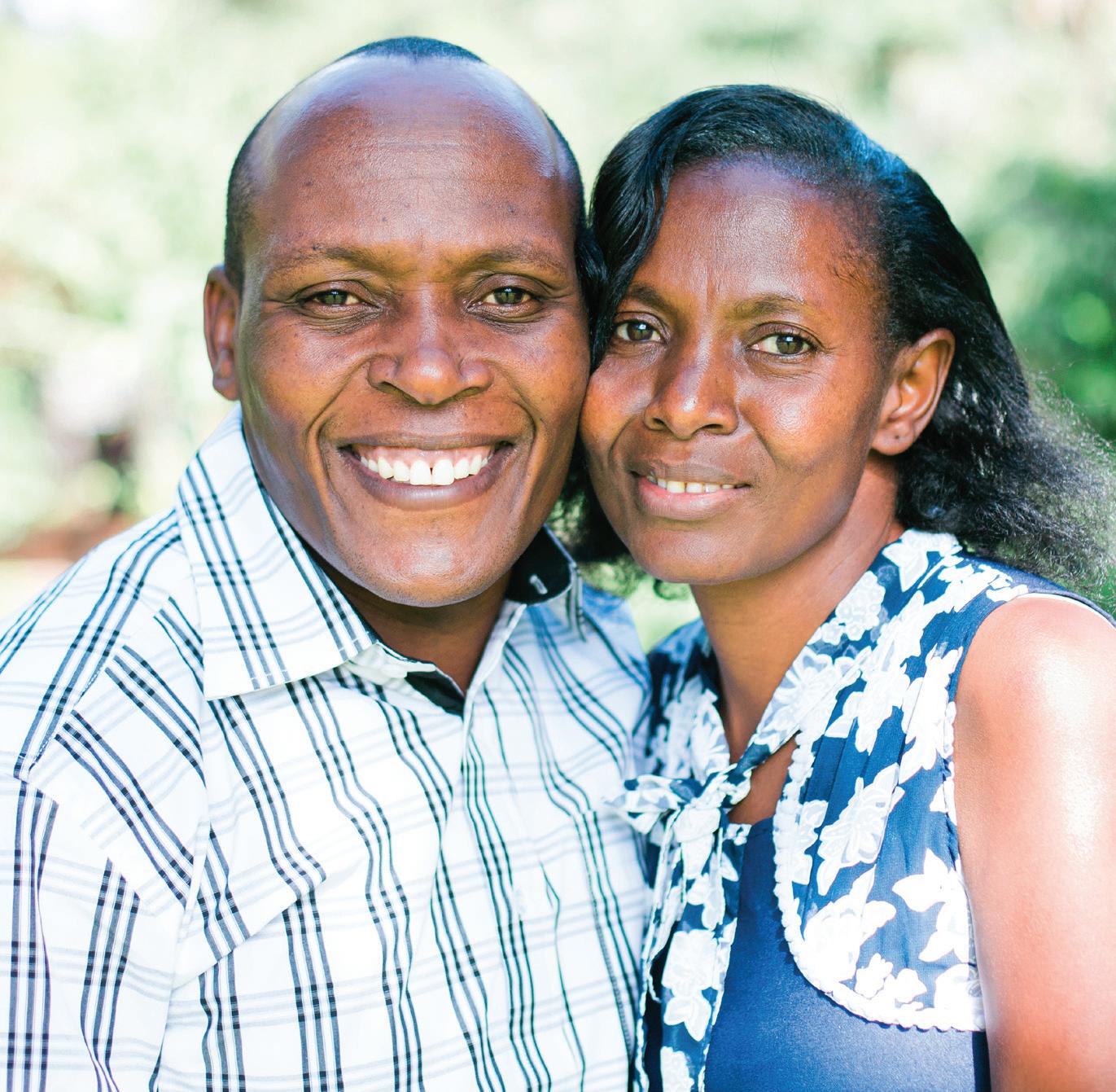


In September 1999, the pastor of my local church announced that he was about to launch the Schools and Colleges Ministry. In that Sunday service, I sensed God calling me to minister to high school, college and university students. I was actively involved in this work until 2003, when I joined Christ Co-workers’ Fellowship.








I also joined Kenya Students’ Christian Fellowship (KSCF) and the Fellowship of Christian Union Students (FOCUS), which kept me involved in student ministry. And at church I was asked to take charge of the Teens and Junior Youth Ministries. In 2005 I met Lucy Mutheu, when she joined my church. Lucy had been actively involved in student ministry, and when I asked her to consider joining me in youth work at church, she agreed. God had brought us together for a purpose: we were married in July 2009.
I was accepted into SIM Kenya as a missionary in 2010, and the following year I became a Youth Worker, focusing on investing in local churches in developing discipleship and mentoring programmes for in-school and out-ofschool youth aged 15 to 24. Our Youth Mentors initiative invests in local churches, developing discipleship and mentoring programmes for young people. Several churches have adopted secondary schools. Young people in their twenties are trained and mobilised to launch Peer Mentoring in the church’s adopted school. Eleventh grade students (aged 16-17) are matched with ninth graders to mentor them.
Lucy continues to co-lead youth work with me at church. She is also an Associate Member of KSCF and FOCUS. Through this work Youth 4 Abolition was established, which seeks to invest in local churches, creating awareness among youth about human trafficking in Nairobi and the surrounding area.
Thaddeus and Lucy want to see para-church organisations partner with churches to develop effective and sustainable discipleship and mentoring programmes for youth. thaddeus.gichana@sim.org
In that Sunday service I sensed God calling me to minister to high school, college and university students.
There are many ways young people can get involved in missions. Some of them may seem to be behind the scenes, but they are still critical. Twenty-four-yearold Kirubel Girma is Personal Assistant at SIM’s East African Office (EAO) in Addis Ababa, Ethiopia. In this role he helps the Director, Worku Hailemariam, with a range of projects, learning about world mission in the process.
“In general, I help new missionary candidates from East Africa as they process through our office,” says Kiru. ”I also help with communications and debrief missionaries who are on home assignment. God is exposing me to field work and training me for mission.”
A couple of years ago Kirubel was studying accountancy when he sensed the Lord telling him to leave his course
In 2017 the Evangelical Church of Liberia (ECOL) National Youth leadership placed a focus on missions. It was a new emphasis for the young people, so leaders decided to explore for themselves before introducing it.
In April and May ECOL Church Relations Officer and Assistant Missions Director, Rev. Albert S. Lloyd; ECOL Youth Vice President, T-Mark Ellis; and John K. Kpowee, ECOL National
and switch to theology. He obeyed and enrolled at Addis Ababa Bible College (ABC), even though he was a bit worried about how his father might respond. But God had gone before him.
Not long after filling in the enrollment forms, his sister phoned him to say, “Kiru, Dad thinks you would be a good pastor. He suggests you finish this year in your accountancy course and then switch to studying theology.” So Kiru earned his BA in Theological Studies from ABC.
Currently he is working on his master’s degree at Ethiopian Graduate School of Theology. He is keen to experience cross-cultural mission, so the decision to go on to further study was not an easy one. Kiru prayed about it, and talked with his professors, his pastor and a work colleague before deciding it was the right move.
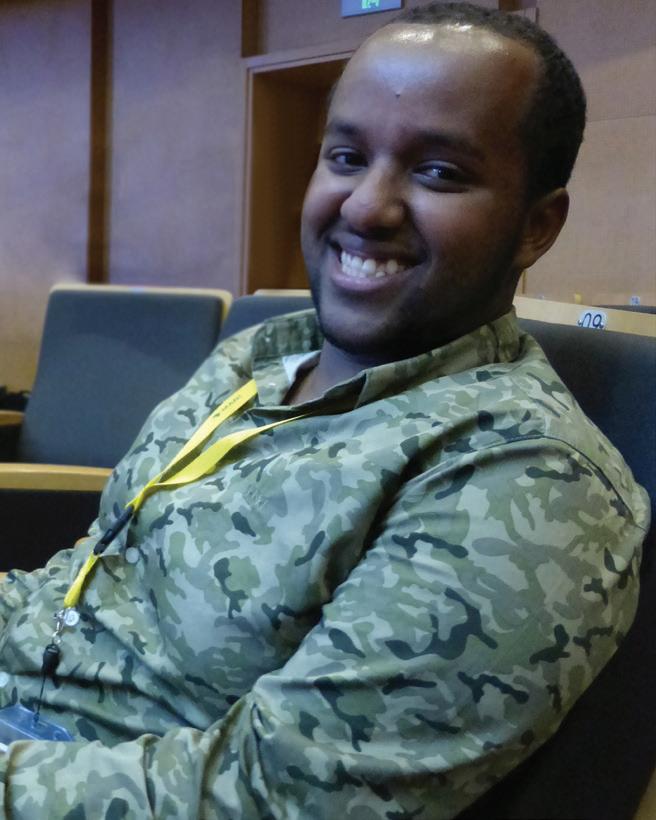
“Jesus prepared for his ministry, and this is my preparation time,” he says.
Youth Coordinator, visited two rural church-planting missions.
The first trip, a three-hour motorcycle journey on rough jungle roads, was to Yarpa town, River Cess county, in southeast Liberia. There they visited Pastor Dexter Brown, commissioned by ECOL in 2016 (see AfriGO 1:3). They did two days of teaching and evangelising, with an emphasis on reaching out to the youth.

The second trip took them to the growing community of Palala, Bong county, in central Liberia. Few Bible-believing
“As God leads, I am taking the time to train in mission through meetings, courses, conferences and other opportunities. My priority is to serve the Lord, and I will do what He tells me to do.”
churches can be found there, but one, Palala Evangelical Church, was birthed out of tragedy. When Pastor Albert Flomo was a high school teacher there in 2016, four motor accidents claimed the lives of three students and a passenger. Flomo encouraged the churches in the community to organise prayer on the high school campus. Because of his positive influence on the students, some of them suggested that a new church be established. Pastor Flomo remained to work with the new fellowship; today regular attendance is 22 to 28, and a new structure is nearing completion.
“Now I understand how a call to the mission field impacts a missionary’s entire family,” says John Kpowee. “They face a change of environment, diet, cultural shock, schooling system, and language. To be honest, I struggle with the idea of putting myself in their place, and moving my family to a remote village where there is no health facility, electricity, clean water or school.
“But I remember that despite the challenges, the prize is higher than the price – even if it costs our lives. Christ, the ultimate example for missionaries, foresaw what it would cost Him … yet He faced the mission field head-on. And He urged us to ‘go and make disciples of all nations’.”
Commitment to youth work was the focus as 100 Malawi church pastors and youth leaders gathered in Blantyre 1115 September for SIM’s Youth Pastors’ Book Set Conference (PBS).
Revd Tim Hawkins called on youth leaders to make a long-term commitment to youth work. He said that doctors do not just work for three years after qualifying, before going on to do something else. So why do youth workers look at short-term commitments to youth before moving on to more “grown-up” work in the church?
He was one of three international speakers who, along with a panel of speakers from across Malawi, addressed those gathered for the event.
Published by Intervarsity Press UK, 2006
Shining like Stars: The Power of the Gospel in the World’s University is a book about the ever-living Christ impacting the citadels of learning – universities and colleges of the world – through the ministry of the International Fellowship of Evangelical Students (IFES). Founded in 1947, IFES has member movements in more than 150 countries.
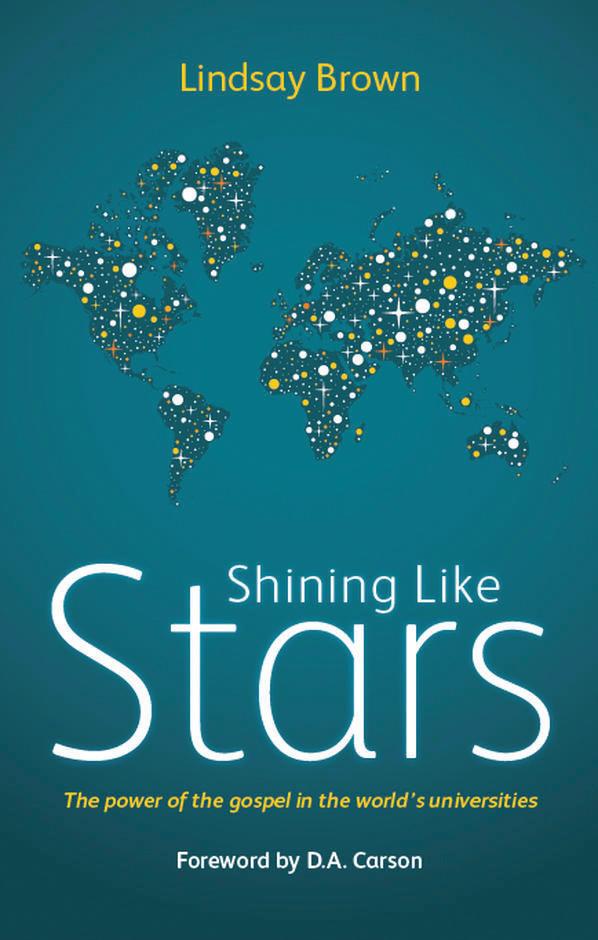
Lindsay Brown’s book showcases God’s marvellous work through students. Christ is portrayed as Lord of the university, and we are challenged to take the university seriously. Brown stresses the fact that students are powerful and strategic in God’s mission. He paints a picture not just of God’s sovereignty and power in carrying out his agenda in the world, but also of human courage in the midst of the most daunting odds.
The author brings out the strategic role of IFES in raising and training up local and national church leaders, as wells as marketplace leaders who are
Participants discussed topics ranging from the globalisation of youth to youth sexuality.
Pete Ong, SIM Malawi Youth Co-ordinator and organiser of the event, says, “Youth accounts for around 75 per cent of Malawi’s population, so
it is vital that we resource and equip pastors and youth leaders to work more effectively with this important part of the Church.”
It is hoped that a similar conference will be held in 2018 in Lilongwe, the nation’s capital.
We look at diaspora and mission. What unique opportunities do African diaspora churches have to bring the gospel to their neighbours in foreign contexts? Are diaspora churches having an influence on churches back on the continent? How can African diaspora pastors ensure their congregations are Great Commission minded, rather than inward-looking?
Do you have questions about this issue’s theme or other missions topics? What issues or subjects would you like AfriGO to cover? We welcome your input, so that we can make the magazine as relevant and comprehensive as possible. Please email info@afrigo.org with your questions and ideas.
making a difference for Christ in their various spheres of influence. His book tells the amazing story of IFES and God’s faithfulness. We see this through the unrelenting toil and perseverance of his faithful disciples (staff, students and graduates), who often work in very challenging contexts.
Brown reminds the Church of the vital and strategic role of student ministry in world evangelisation. He manages to rescue student ministry from the “fringe” of global missions, and places it at the very centre of God’s mission. He shows how student ministry, though fragile, is God’s instrument to capture the most strategic institution for changing human culture and shaping the future of our world.
The book distils the very principles that have distinguished the IFES ministry, setting them within a solid biblical framework and telling wonderful stories of God’s activity through ordinary human beings. It is inspiring and difficult to put down. It gives the definite impression that the IFES story is still unfolding, leaving readers longing for a sequel!
Lindsay Brown worked with IFES for several years, and served as General Secretary. An Oxford University history graduate, he led IFES to phenomenal growth and expansion. His book is a dynamic, captivating and informative account of God’s work in the world’s universities.
Reviewed by Chizoba Noel Adimba, NIFES Editor/Communications OfficerCurrently 1,497 registered universities and tertiary institutions in Africa serve approximately five million students. In general, about 60 per cent of the African population identify as Christians and about 30 per cent as Muslims. The North and parts of West Africa have a higher Muslim-Christian ratio, while East, Central and Southern Africa are predominantly Christian. Among Christians there is wide diversity in fundamental beliefs among the Orthodox, Catholics, Evangelicals and Pentecostals.
Historically, the most effective approach to evangelism has been student-to-student, through individual and group initiatives. Students’ initiative and commitment to evangelism and mission have resulted in encouraging growth in the number of Christians. Approaches include door-to-door evangelism, sports
• Today 1,497 registered universities and tertiary institutions in Africa serve approximately five million students.
• Organised student ministry and non-denominational Christian Unions can be found in 48 out of 54 African countries.
• In English- and Portuguese-speaking Africa, the number of IFES students actively involved in Christian Unions has grown from 100,000 in 2008 to 185,000 in February 2017.
• The infiltration of false doctrine is a big challenge to student ministry.
evangelism, and distributing evangelistic tracts. And churches and para-church organisations offer their tailor-made student outreach programmes.
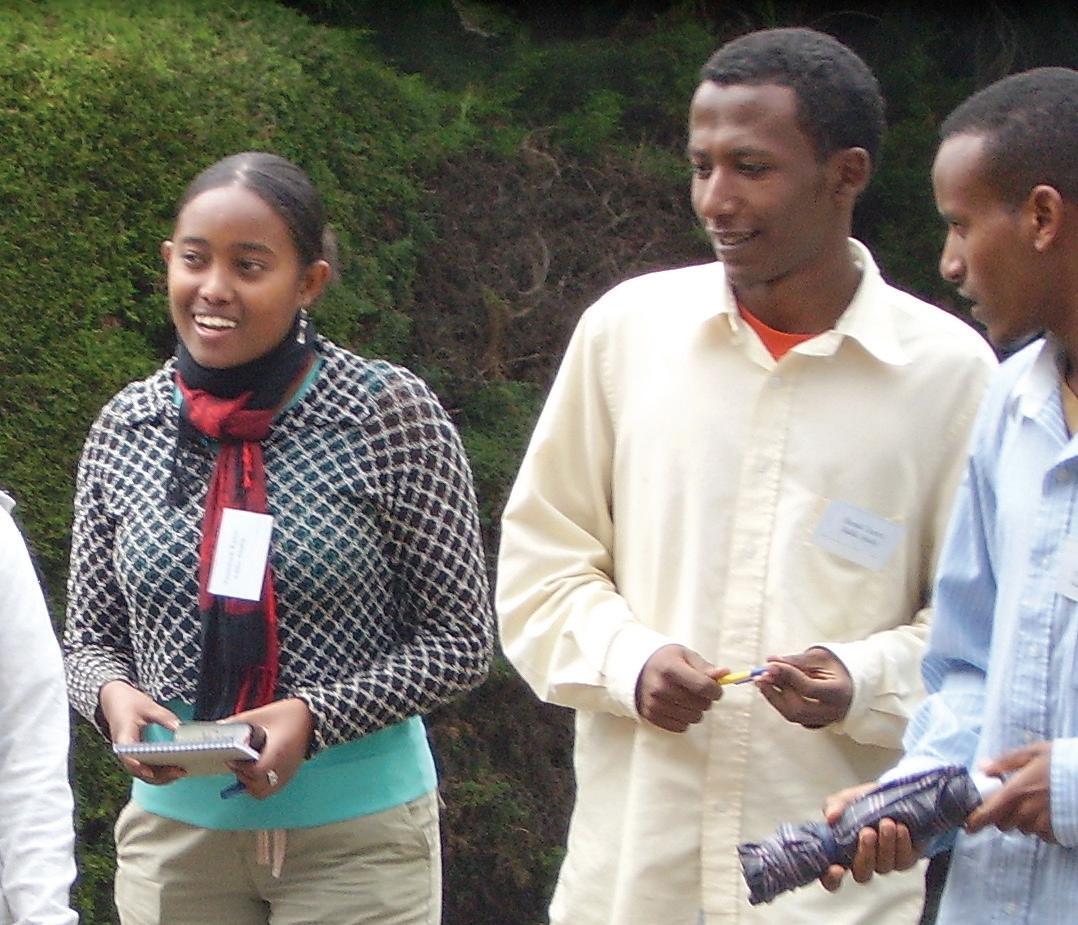
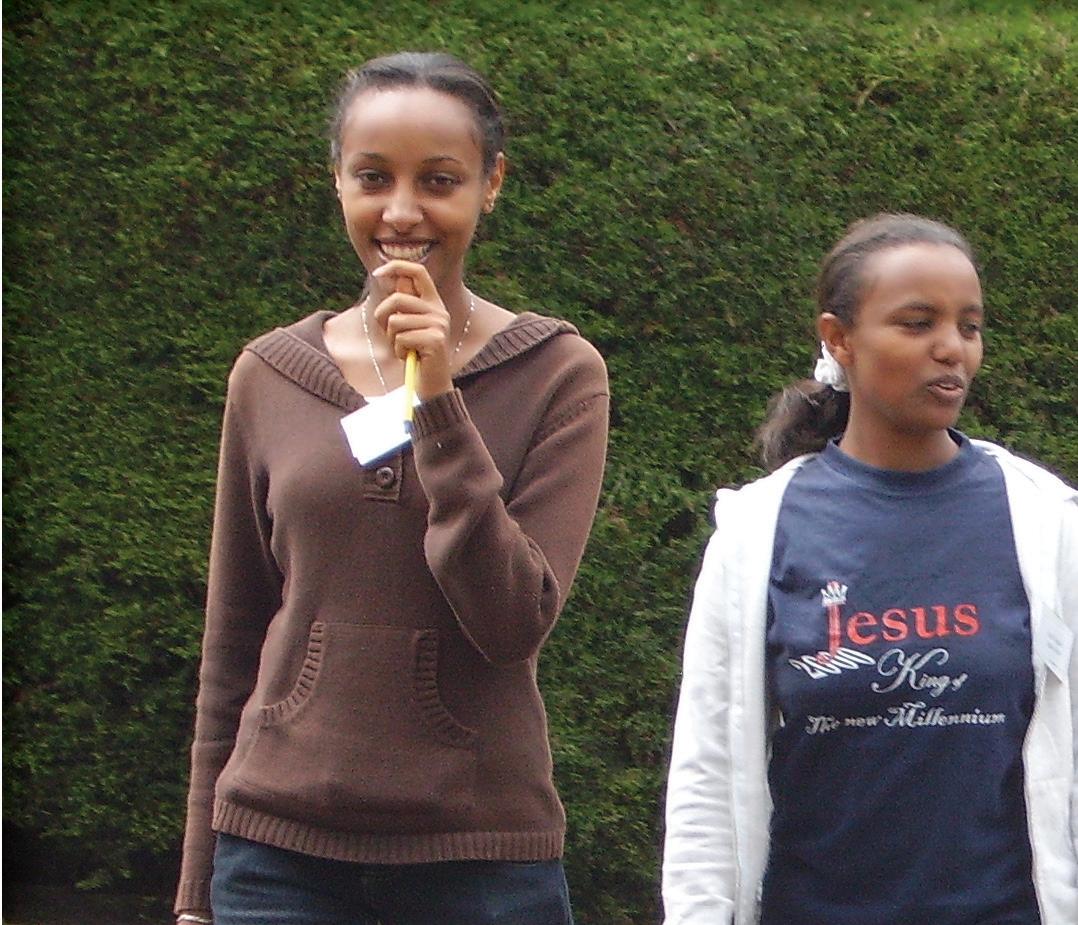
At a January 2017 IFES consultation, stakeholders, students and student ministry workers reported a growing tendency for students to be more enthusiastic about off-campus outreaches than about reaching fellow students. Because it is far easier and more effective for students to witness to their peers and do unhurried follow-up, this decreasing enthusiasm for peer evangelism is concerning. Another significant challenge is the infiltration of false doctrine, especially the prosperity gospel. Many students who consider themselves believers need to be tactfully engaged with the authentic gospel of Christ.
*Ranking Web of Universities, July 2017
• Inspire students and student workers with innovative ways to evangelise.
• Mobilise more student workers to match the increasing demand for higher education in Africa. Ask Him to equip them with practical skills and theological and intellectual knowledge, to effectively engage others.
• Move education stakeholders to make education affordable for all, as costs continue to soar. Pray particularly for students in Southern Africa, where dropout rates are high.
• Protect students in volatile countries where Christian gatherings are not permitted
SIM East Africa Tel: +251 911 206 530 east-africa.office@sim.org

SIM West Africa Tel: +233 30 222 5225 wamo.personnel@sim.org

SIM Southern Africa Tel: +27 21 7153200 za.enquiries@sim.org
AIM International amc.io@aimint.org